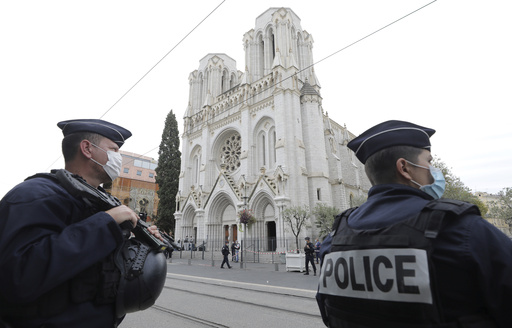
PARIS — A Tunisian individual is currently on trial in France facing terrorism-related charges linked to the murder of three victims in a basilica located in Nice on the French Riviera in 2020. This incident was one of several attacks that year associated with Islamic extremism.
The accused, Brahim Aouissaoui, now 25 years old, was the sole defendant as the trial commenced, and he has not identified any associates or sponsors. He suffered serious injuries during a confrontation with police and claims to have no recollection of the events. The attack was among the third such incident attributed to Islamic extremists within a short timeframe, leading the French government to elevate its security measures to the highest alert level. This event coincided with a trial regarding the 2015 assaults on the satirical magazine Charlie Hebdo, known for its controversial cartoons depicting the Islamic prophet.
Today, France remains vigilant particularly against domestic extremist threats that have been exacerbated by activities on internet platforms. As the trial began in Paris, Aouissaoui communicated through an interpreter. He is facing serious charges that include terrorist murder and attempted terrorist murder, with a potential sentence of life imprisonment looming if he is found guilty.
On October 29, 2020, Aouissaoui is accused of fatally stabbing churchgoers Nadine Vincent, 60, and Simone Barreto, a 44-year-old French-Brazilian national, along with church employee Vincent Loquès, aged 55. During the attack, he allegedly lunged at police while shouting “Allahu Akbar” (God is great) and brandishing a knife. He was subsequently shot and sustained severe injuries, requiring two surgeries and a stay in intensive care.
Throughout the investigation, Aouissaoui has consistently stated that he remembers nothing about the assault and has provided minimal cooperation. He claimed that both of his parents were deceased, a statement that has been disproved, and mentioned that he could not recognize himself in the footage that captured his entry into the basilica.
Psychiatrists and a neurologist have concluded that Aouissaoui does not suffer from total amnesia. According to reports, the nature of his memory loss appears to be a tactic employed as part of a defense strategy and a reluctance to engage with the investigation. Experts have characterized him as an individual who went through phases of addiction, a period of strict discipline, followed by radicalization that culminated in terrorist actions.
Aouissaoui has exhibited behavioral issues while incarcerated and has cycled through five different prison facilities. The attorney representing the family of one of the victims described him as a “radicalized, indoctrinated Salafist” who aligns with al-Qaida ideologies that congratulated him for his violent actions.
Investigation records suggest that Aouissaoui departed Tunisia by boat on the night of September 18-19, 2020. Upon arriving at the Italian island of Lampedusa, a known entry point for migrants into Europe, he was placed in quarantine. By October 9, he had reached Bari in southern Italy, where he received an order to leave the country. Instead, he returned to Sicily, working to fund a train journey to Rome and subsequently to Nice.
Investigators noted that Aouissaoui had been closely following al-Qaida’s threats against France leading up to the opening of the trial regarding the Charlie Hebdo attacks. He was reported to have referred to France derogatorily as “a country of miscreants and dogs.” Furthermore, he had scouted the basilica multiple times prior to the attack, indicating that it had been planned for several weeks.

